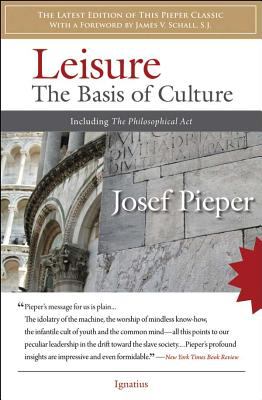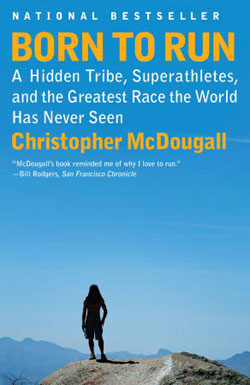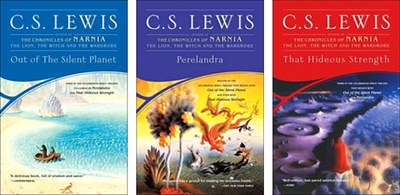Usually I anticipate Summer reading like a shopaholic preparing for Black Friday. The few spare moments of the Winter months are spent compiling a master list of books I ought to read but have little freedom to during the academic year, which I pounce upon as soon as I'm able. When this Summer began, however, life just got busier. Consequently, this year's list of 'books read is depressingly meager when measured against an average season. But as Summer is only half-over, after all, it is not too late to fit in some good reading. Here are a few titles that I have recently [re-] read, and are well worth your while.
 Leisure: The Basis of Culture
Josef Pieper
Leisure: The Basis of Culture
Josef Pieper
I first read Josef Pieper's
Leisure: The Basis of Culture towards the beginning of library school, and found it refreshing after years of rationalizing workaholic behavior and living in a culture obsessed with work (even if, sometimes, for the right reasons). This short essay, paired with
The Philosophical Act, examines the fundamental roots of leisure in celebratory sacrifice. Anyone tired of modern workaholic culture or its equally frustrating counterpart of commodified recreation will enjoy this little book. It is a very timely read for Summer, or if you are trying to regain a sense of balance, peace, and order in your life. And at just around 75 pages, it doesn't require a huge investment of time.
Space Trilogy (Out of the Silent Planet, Perelandra, That Hideous Strength)
C.S. Lewis
"A pleasure is full grown only when it is remembered...You say you have poets in your world. Do they not teach you this?"
So an inquisitive alien asks in the first volume of this marvelous sci-fi trilogy from the mind of C.S. Lewis. The delight of the trilogy for me definitely seems to grow progressively with the remembrance of each read. One can think of this series as a slightly more grown-up segway from Narnia. As someone who loved Madeline L'Engle's Wrinkle in Time series growing up, I quickly adopted the Space Trilogy as a natural favorite, with its unique blend of space adventure, philosophy, and theology (more like sci-fi with a bit of the latter two sprinkled in). That Hideous Strength, with its blend of militaristic drama, academic politics, sorcery, and subtle commentary on love, stands out as my favorite of the three. Those who have only explored Lewis' more theological writing (e.g., Screwtape Letters, The Great Divorce) will enjoy a new dimension of his imagination in the Space Trilogy.
 Born to Run: A Hidden Tribe, Superathletes, and the Greatest Race the World has Never Seen
Christopher McDougall
Born to Run: A Hidden Tribe, Superathletes, and the Greatest Race the World has Never Seen
Christopher McDougall
As a rule, I normally treat most contemporary writing as a secondary concern, to be explored after the more enduring works essential to a lifetime reading list. But
Born to Run was just too intriguing to save for later. Motivated by the mystery of foot pain, journalist Christopher McDougall presents a delightfully entertaining narrative of his search for the Tarahumara, a reclusive Mexican people who drink corn beer and run ultramarathons in the canyon desert in bare feet. My favorite chapter has to be McDougall's discussion of the ancient practice of persistence hunting, wherein packs of men essentially chase animals to death (the human body never fails to amaze). With its energy-filled story-telling and exploration of human physiology and anthropology,
Born to Run is sure to inspire the runner within to hit the road with new life. And it may tempt you to abandon your sneakers and go 'au naturale.'
Letters of J.R.R. Tolkien
 Edited by Humphrey Carpenter
Edited by Humphrey Carpenter
"Well, there you are, a hobbit amongst the Urukhai. Keep up your hobbitry in heart, and think that all stories feel like that when you are in them. You are inside a very great story!"
-J.R.R. Tolkien to Christopher Tolkien (at war), 6 May 1944
Influenced by a recent conversation with a good friend, I decided to take up
The Letters of J.R.R. Tolkien (after all, it serves a good prelude to a necessary re-reading of
The Hobbit before its big screen debut this winter). I have only cracked the surface of this tremendously heart-warming collection of correspondence, and already feel compelled to recommend it without reservation. Like an ageless child, Tolkien's pen seems to be the gateway of a conduit to his heart. The letters to his editors are playful and humble, while those to his wife and children read as effusive parcels of love. His correspondence clearly shows a man with an expansive heart and boundless imagination. Tolkien writes frankly about moral principles and virtue in the wake of wartime, which largely formed the backdrop for his composition of
The Lord of the Rings. Not to mention his notes to his sons are frequently sprinkled with Elvish, Latin, and Anglo-Saxon turns of phrase and remarks on the liturgical calendar.
Letters of J.R.R. Tolkien is sure to inspire Tolkien fans and captivate new ones.
Happy Reading!












